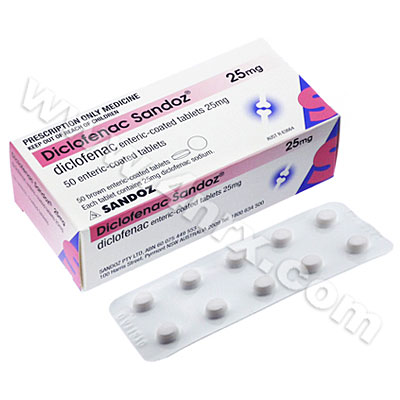 |
Home  Pain Pain  Diclofenac Sandoz (Diclofenac Sodium) Diclofenac Sandoz (Diclofenac Sodium) |
|
|||||||||
|
Diclofenac Sandoz (Diclofenac Sodium)
What is Diclofenac Sandoz (Diclofenac Sodium) used for? Diclofenac Sandoz (Diclofenac Sodium) is a type of anti-inflammatory drug which is used to treat pain and inflammation caused by conditions such as arthritis and ankylosing spondylitis. It belongs to a class of medications known as nonsteroidal anti-inflammatory drugs, or NSAIDs, which work by helping to reduce certain substances in the body which cause inflammation to occur. It may also be used to treat other conditions. How should I use Diclofenac Sandoz (Diclofenac Sodium)? Diclofenac Sandoz (Diclofenac Sodium) comes in the form of enteric coated tablets, which are taken orally with a full glass of water. The exact dosage required varies, depending on the condition being treated. Patients are advised to consult their physician prior to commencing treatment with this drug, in order for the correct dosage to be prescribed. Patients should be aware that it may take 2 weeks for the full benefits of this drug to take effect. What are the side effects of Diclofenac Sandoz (Diclofenac Sodium)? Some side effects may occur as a result of taking Diclofenac Sandoz (Diclofenac Sodium), such as:
You should consult your physician immediately if any of these side effects persists or worsens, or if you notice any other more serious side effects, such as pain in the chest, breathlessness, changes in vision, bloody stools, unusual weight gain, severe nausea, yellowing of the eyes or skin or fever. Please Note Strictly follow all instructions provided to you by your physician or pharmacist while using Diclofenac Sandoz (Diclofenac Sodium). Optimum and safe dosage can differ based on the patient and the condition being treated. As this medication may be unsafe for certain patients, it is essential you always inform your physician if you are pregnant or breastfeeding, as well as if you have any allergies, other illnesses, or ongoing health conditions, especially asthma, high blood pressure or kidney disease, and if you are taking any other form of medication, supplements, or herbal products. Immediately seek emergency medical care if you have any allergic or hypersensitive reaction. Common signs of a reaction include hives, swelling, skin rashes, chest pains, as well as trouble breathing or swallowing. 
|
|||||||||||||||||